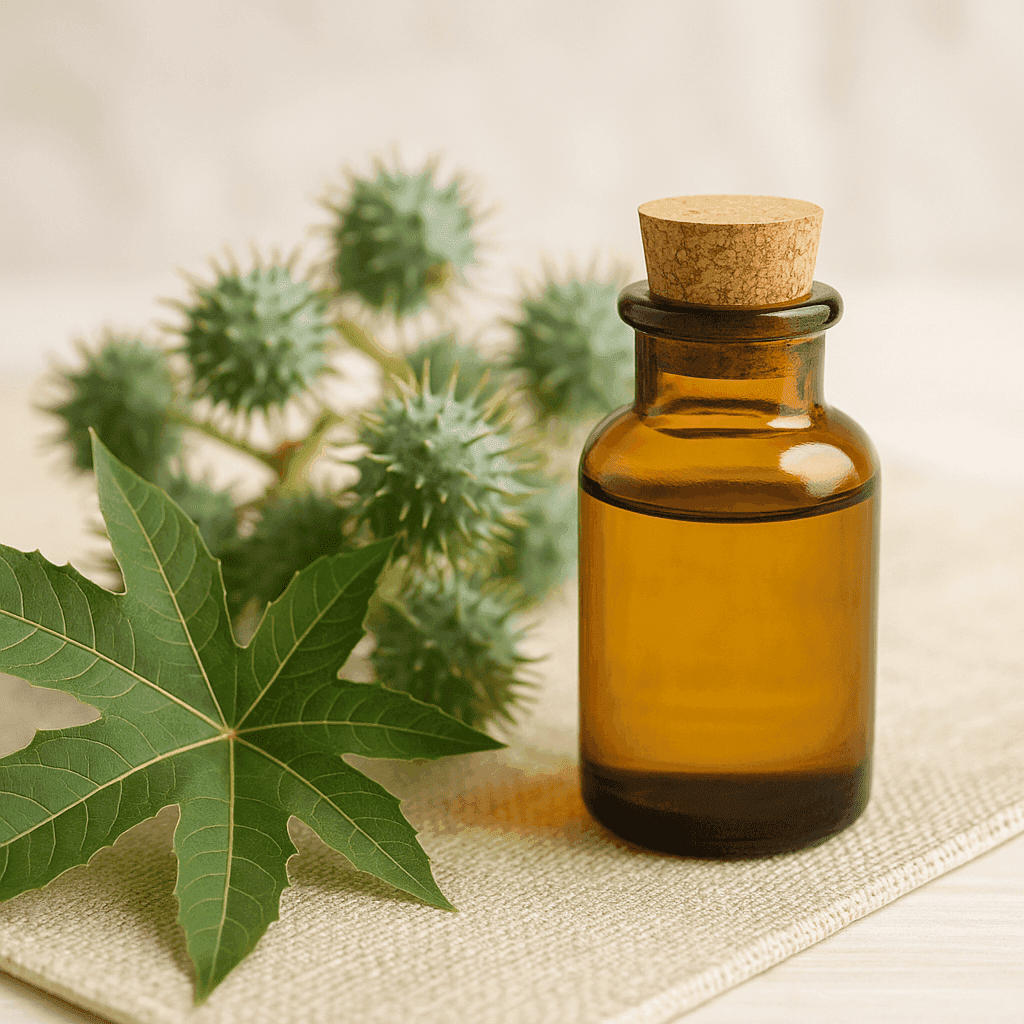
In This Article
- Introduction: The Amazing World of Castor Oil
- Toenail Fungus Treatment
- Bruise Prevention and Healing
- Actinic Keratosis (Pre-Cancerous Skin Spots)
- Cracked Fingertips and Angular Cheilitis
- Wart Removal
- Keloid and Scar Treatment
- Joint Pain and Knee Problems
- Itching and Insect Bites
- Traditional Uses and Safety Considerations
Introduction: The Amazing World of Castor Oil
Castor oil has been making headlines in our mailbag for decades, and frankly, we’re still amazed by the creative ways readers discover to use this ancient remedy. From toenail fungus to joint pain, fromto pre-cancerous skin spots, castor oil keeps surprising us with its versatility.
This isn’t your typical medical summary—it’s a collection of real stories from real people who’ve wrestled with stubborn health problems and found relief in a bottle that probably costs less than your morning coffee. Some of these tales might sound too good to be true, but we’ve heard them repeatedly from readers across the country.
The oil comes from the seeds of the Ricinus communis plant, which has been used for thousands of years. The ancient Egyptians used castor oil in their lamps because it was slow burning. They also used it as a body oil for their skin and valued it medicinally as a laxative. The famed Christian mystic, Edgar Cayce, loved castor oil, aka Palma Christi (the palm of Christ). He wrote about it in his books and used it for fungal infections, acne, inflammation and wound healing.
Now, before we dive into the treasure trove of reader experiences, let’s be crystal clear: castor oil is messy, sometimes smelly, and definitely not a substitute for proper medical care. Always test it on a small patch of skin first, and if you have serious medical conditions, consult with your healthcare provider. But for those everyday bumps, scrapes, and stubborn conditions that conventional medicine hasn’t quite conquered, castor oil might just be the ancient secret you’ve been looking for.
Ready to explore what readers have discovered? Let’s dive in!
Toenail Fungus Treatment
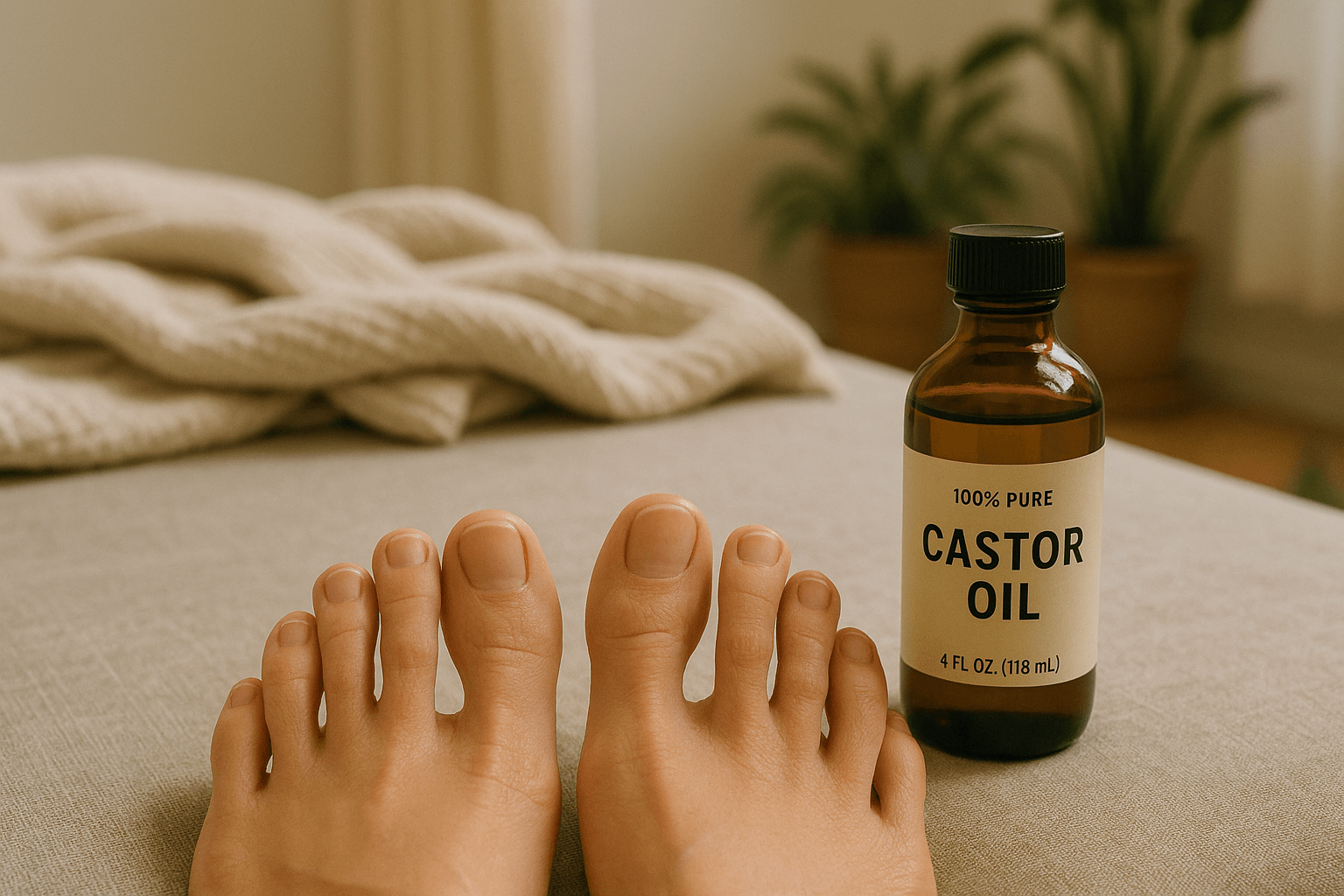
What can you do to get rid of your toenail fungus? Many readers have wrestled with that question, and some have discovered ingenious solutions. Here is one we hadn’t encountered before.
Castor Oil to Treat Your Toenail Fungus:
Q. Rather than a question, I offer a note about toenail fungus treatment. I have treated my toenails with Listerine for a few years but saw only slight improvement.
A couple of months ago, I started applying castor oil to my toenails after showering. The improvement was clear within a few days.
I continue to apply castor oil to my toenails once or twice a week. My toes and feet haven’t looked so good in years. I hope this helps someone else.
Home Remedies for Your Toenail Fungus:
A. We could find no scientific research to support the use of castor oil (Ricinus communis) against nail fungus. The leaves of this plant, however, have been shown to possess both antibacterial and antifungal activity (BMC Research Notes, Dec. 1, 2017).
Castor oil is greasy. Applying this oil to your toenail fungus might be messy. Be careful not to slip.
Nail fungus itself is not dangerous, but it is unsightly. People often report that nails infected by a common fungal organism such as Trichophyton rubrum become thick and very hard to cut.
Are There Other Approaches for Your Toenail Fungus?
There are many other home remedies for nail fungus that readers may find helpful, including Vicks VapoRub, Listerine and white vinegar soaks, topical hydrogen peroxide, cornmeal, tea tree oil and white iodine. To learn more about these and other nail fungus treatments, you may want to read our book, Quick & Handy Home Remedies. It is available at your local library or at www.PeoplesPharmacy.com.
Bruise Prevention and Healing
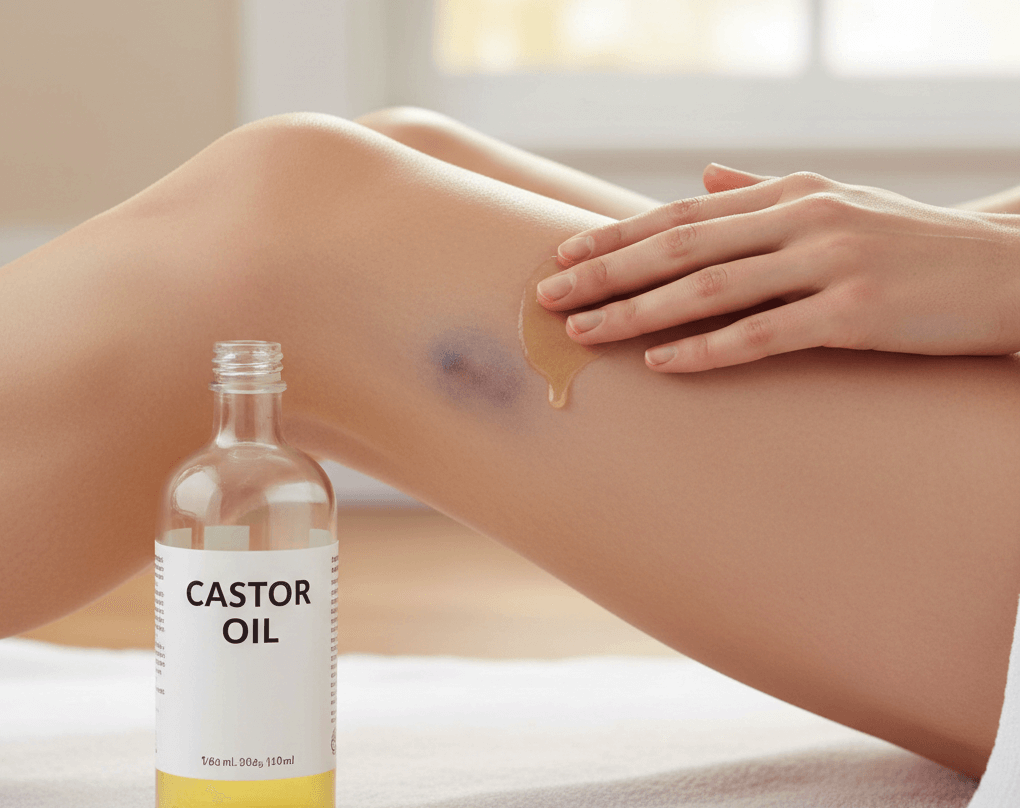
Some home remedies date back thousands of years. Such is the case with castor oil. Readers keep coming up with new uses for this ancient plant.
Castor oil has been used for thousands of years as a home remedy. The seeds of the castor bean also make one of the deadliest poisons known to man—ricin. Fortunately, ricin is not found in the oil. That’s why people have come up with some interesting uses for this very old natural product.
Family Remedy Passed Down Through Generations:
Q. Whenever my children hurt themselves, the first thing I reached for was the castor oil. My mother-in-law’s uncle was a boxer and always used it after a boxing match to prevent hematomas and bruising.
This approach works like a charm. It has been passed down as a remedy in my family for many years.
A. Thanks for sharing your family remedy. We have heard from others that applying castor oil (Ricinus communis) after a bump can often avert a bruise.
A lacrosse player shared his experience:
“I used castor oil in lacrosse for years. I would put on the oil and cover it with plastic wrap. The bruise would usually be gone the next day. That frustrated a lot of players because they would swear that they hit you, and then they wouldn’t see the evidence.”
The Heavy Chair Incident:
Q. My mother-in-law uses castor oil for bruises. At Christmas, my sister-in-law sat down in a very heavy old rocker-recliner chair. It went crashing to the floor, and one corner landed right on top of my mother-in-law’s foot.
My sister-in-law was dazed and took a moment to get up, which meant my mother-in-law’s foot was trapped under the chair for a few seconds. She was screaming!
We all urged my mother-in-law to go to the hospital to make sure no bones in her foot were broken, but she refused. Instead she slathered the top of her foot with a generous amount of castor oil. She said that castor oil applied immediately to a bump reduces swelling and prevents bruising.
I didn’t believe it until the next day when I saw that her foot was fine! I don’t advocate castor oil for serious injuries, and I do think my mother-in-law should have had her foot X-rayed, but for minor accidents, it works great!
A. Castor oil contains ricinoleic acid. This compound has both pro- and anti-inflammatory effects (European Journal of Pharmacology, Oct. 27, 2000). Regular topical use seems to improve pain tolerance, but no one has studied an anti-bruising effect.
More Reader Success Stories with Bruises:
S.H. offers a different use for castor oil:
“Castor Oil is a life saver for joints, especially knees.
“A few years ago, my husband hurt/twisted his knee while getting in and out of a huge truck. The pain only increased as time went by, so we went to urgent care; after x-rays, etc., my husband was told that it really required surgery to repair and fix his knee, which was NOT in our budget at the time. What to do?
“We had already heard about using this oil on joints from a couple of doctors (M.D.s) with knowledge in natural remedies, also. According to instructions, I massaged the oil oil into his whole knee area; then I wrapped the whole area with an old cloth/rag (that I would continue to keep stored/sealed in a zippy-bag, for re-use) and with plastic-type-wrap, because castor oil is both oily and staining–it will not wash out. We kept the wrappings on his knee over night.
“I had to beg my husband to let me apply the oil and wrappings, initially on the first night. The second night, he reminded me to fix up his knee again. Night number three, he did it himself, on his own. He woke up the next morning, with his knee feeling great.
“If/when he or I ever hurt any joint, both of us know to rub with the castor oil, wrap with an old rag, cover for a while, and get relief. There is nothing like it for knees and joints. The oil is messy, but who cares, if it helps prevent or STOP the need for surgery and if it stops pain?”
L.C.F. tells a great story about bruise prevention:
“Whenever my children hurt themselves, the first thing I reached for was the castor oil. My mother-in-law’s uncle was a boxer and castor oil was what they used after a boxing match to prevent hematomas and bruising. It works like a charm. It has been passed down as a remedy in my family for many years.”
Tom D. accumulated a lot of bruises as a Lacrosse player:
“Used oil from the castor bean in Lacrosse for years. Put on the oil and wrapped it with plastic wrap, bruise would at times be gone the next day. Frustrated a lot of players because they would swear that they hit you… :-) ”
M.M. is super susceptible to bruising:
“Castor Oil DEFINITELY WORKS!!! I am a huge bruiser, esp. since I am borderline anemic and whenever I bruise and I apply castor oil right away directly to bruise and rub it in a bit, it significantly minimizes the bruise right away and/or decreases the severity or # of days it shows! I love it!”
Actinic Keratosis (Pre-Cancerous Skin Spots)
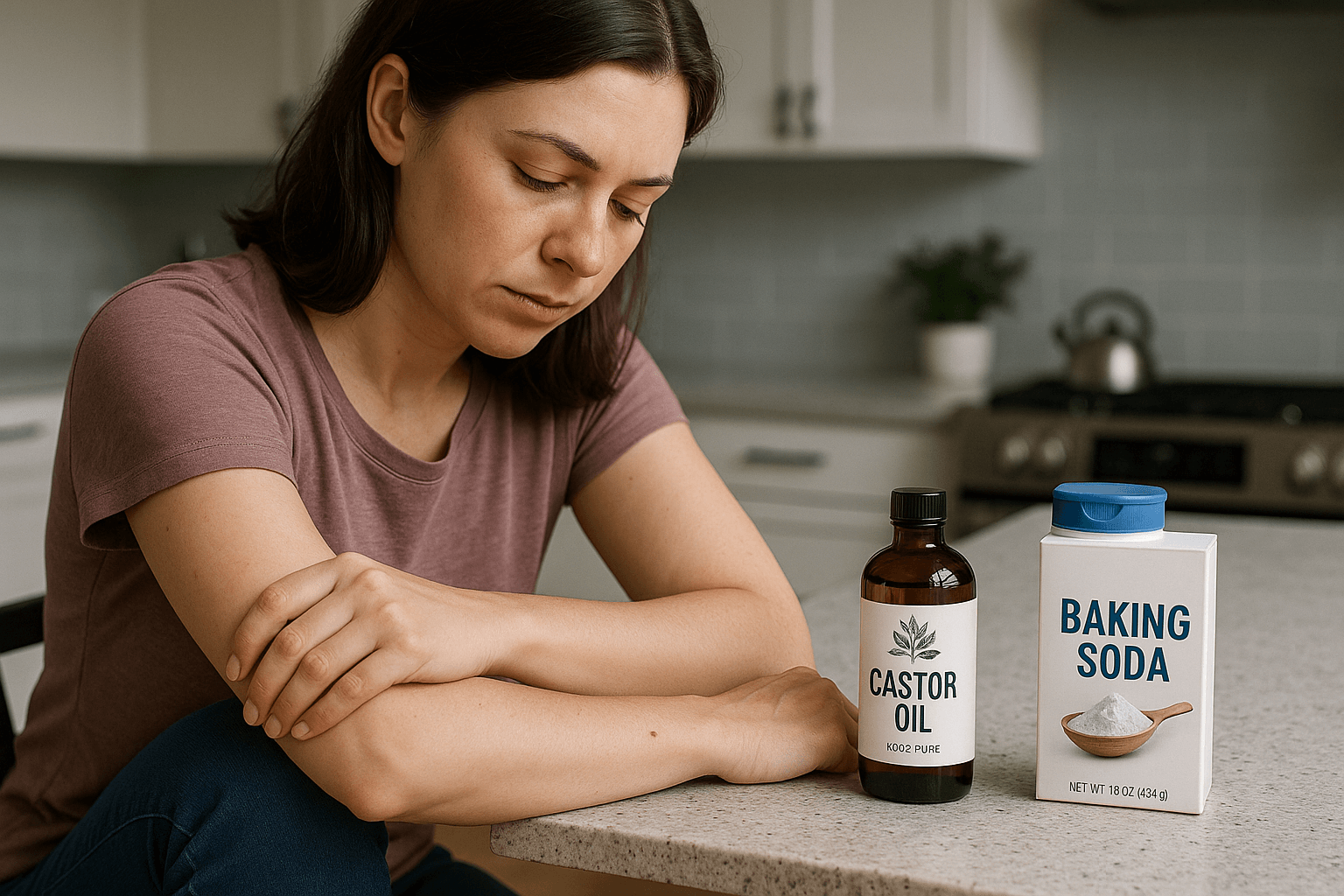
Have you had a dermatologist examine the lumps and bumps on your skin? It is a good idea to have these checked periodically, especially if they have changed in any way. The doctor might diagnose some of the rough scaly patches on your skin as actinic keratoses. Could castor oil help clear them up? Some readers say yes.
Castor Oil and Baking Soda for Actinic Keratosis:
Q. I used castor oil mixed with baking soda to treat a prominent actinic keratosis that I’d had for years. It was gone after two days and hasn’t come back two years later. I can’t remember where I heard about this remedy, but others might want to know about it.
A. Actinic keratoses are pre-cancerous skin lesions. They are common on aging skin that has been exposed to ultraviolet radiation from the sun and may feel scaly or rough. Sometimes they itch or burn. A dermatologist should examine all such spots from time to time, as they could be an early form of skin cancer.
You are not the first person to report that castor oil could help an actinic keratosis, though other readers did not include the baking soda. We could not find any published studies of this remedy, but it seems benign. If it doesn’t work, the dermatologist can use a more standard approach such as freezing it off (cryotherapy) or applying a medicine like 5-fluorouracil (5-FU) cream, imiquimod (Aldara) cream or ingenol (Picato) gel.
Dermatologist Recommended Castor Oil for Actinic Keratosis:
Q. I thought you should know that years ago my husband’s dermatologist told him to use castor oil on pre-cancerous spots on his face. They all just sort of fell off and he never had to have any removed surgically.
A. We have to admit that we are surprised a dermatologist would actually recommend castor oil for pre-cancerous skin lesions. Most skin specialists would treat such a condition with standard approaches such as cryosurgery (freezing the abnormal cells), topical medications like 5-fluorouracil (5-FU) cream, imiquimod (Aldara) cream or ingenol (Picato) gel.
Some dermatologists opt for scraping (curettage) followed by cauterization (electrosurgery). Others use a laser to remove the abnormal cells.
Does Castor Oil Do Anything?
We searched the medical literature for research on castor oil against actinic keratosis, which is a skin lesion resulting from sun exposure. Such spots are often categorized as pre-cancerous changes that can turn into squamous cell carcinomas.
We found one reference to an article published in 1982 in the journal Acta Pathologica, Microbiologica, Immunologica, Scandinavica suggesting that castor oil (Ricinus communis) binding to abnormal skin cells could be a useful diagnostic tool. A more recent study suggests that castor oil has both pro-inflammatory and anti-inflammatory activity (Current Drug Topics, Oct 1, 2011). We also found a reference suggesting that castor oil penetrates deep into the skin.
All that said, we could find no credible evidence that castor oil can eliminate actinic keratoses. On the other hand, if a dermatologist were to supervise such treatment and follow a patient with these skin lesions carefully over time, there appears to be low risk. If castor oil did not help the lesions, there are lots of approved treatments the dermatologist could fall back on.
Do You Have Actinic Keratosis?
If you have spent a lot of time out in the sun, there is a reasonable chance you do have actinic keratoses (AKs). How would you know? Do you have places on your skin that feel scaly, a little like sandpaper? Anything on the skin that has a rough patch or that feels uncomfortable when rubbed should be seen by a dermatologist because it could be an actinic keratosis. Itching or burning are other symptoms to bring to the attention of a physician. Some AKs feel wart-like and look like a bump.
Helen B. noted:
“This treatment has been around a long time. 65 years ago my mother had a pre-cancerous spot such as you are describing on her nose. Her doctor told her to rub castor oil on the spot daily for ten days and if it did not come off it would need to be burned off.”
See for Yourself!
One of the very best websites for seeing skin lesions is SkinSight.com. To learn more about actinic keratoses and actually see pictures of this lesion, here is a link.
If you would like to learn more about the medicinal uses of castor oil for a range of conditions including warts, bruises, muscle pain, cracked fingertips, scars or skin tags, click on this link.
If you love quirky, unusual approaches to common conditions, you will find our book, The People’s Pharmacy Quick & Handy Home Remedies a valuable resource.
Citations:
- Graem N, “Ricinus communis agglutinin I binding to the cell membrane in benign, premalignant and malignant epidermal lesions.” Acta Pathologica, Microbiologica, Immunologica Scandinavica, Section A, Pathology, Nov. 1982.
- Aggarwal BB et al, “Identification of novel anti-inflammatory agents from Ayurvedic medicine for prevention of chronic diseases.” Current Drug Targets, Oct. 1, 2011.
Cracked Fingertips and Angular Cheilitis
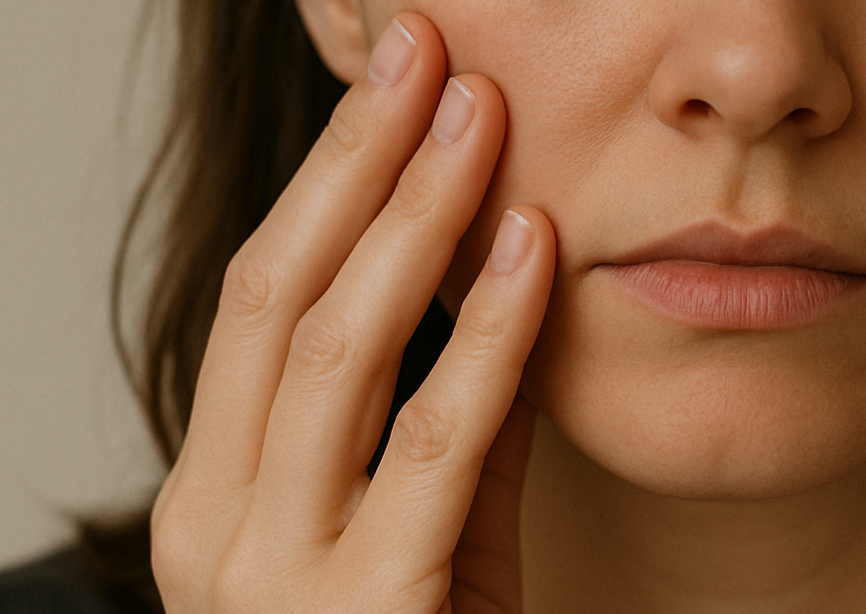
Healing Those Painful Winter Cracks:
Q. After successfully using castor oil to heal those pesky fingertip cracks I get every winter (my cousin’s suggestion), I decided to try it on the corners of my mouth. They are always cracked and sometimes bleed.
Nothing I’ve tried previously–from switching toothpastes to topical and systemic antibiotics or antifungals–has made a difference, and this has been a problem for several years.
After a single night using the castor oil, the cracks had healed significantly. After just one week of use, healing was complete.
I continue to use the oil around my mouth and on my hands every night. I will never be without it!
A. Castor oil has been used for thousands of years orally as a laxative and topically to treat bruises and warts.
Yours is the first report that it helps heal cracked fingertips or angular cheilitis (perleche). These painful cracks at the corner of the mouth may be caused by a fungal infection.
Castor oil has antifungal activity (Asian Pacific Journal of Tropical Biomedicine, Dec., 2012). Perhaps that helps to explain your success.
Wart Removal
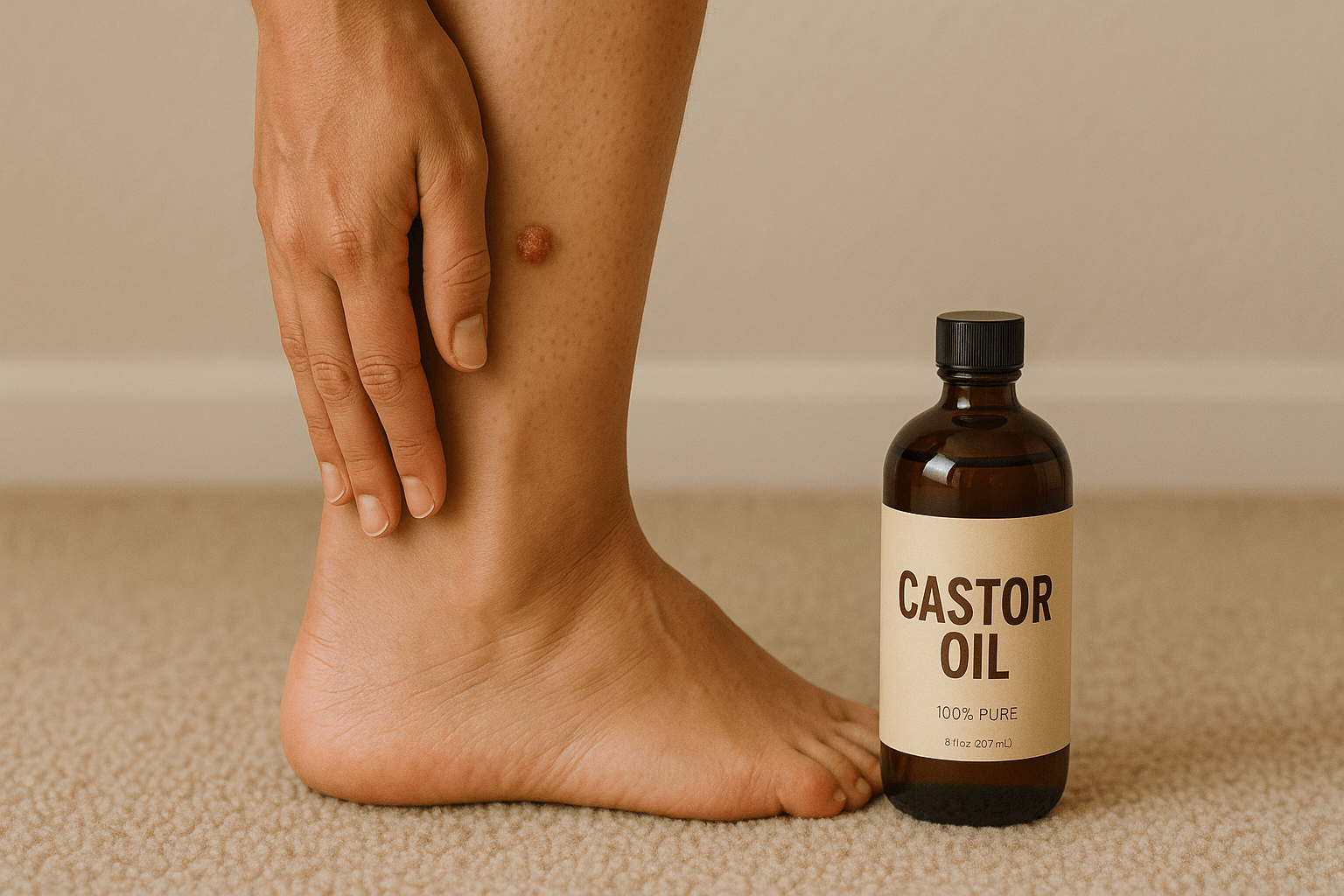
What can you do for warts on the bottom of the foot (plantar warts)? These warts can be quite painful and hard to treat, though people use a range of home remedies to treat them. One reader champions the use of castor oil vs. warts.
How Could You Forget Castor Oil vs. Warts?
Q. PLEASE tell the people who are suffering from plantar warts on the bottom of their feet to use castor oil. Your newspaper column did not include this cure. You mentioned soaking warts in hot water, taking desiccated liver tablets, coating with turmeric paste, and covering the wart with the inside of a banana peel. But you did NOT discuss castor oil.
I suffered for years until I found this, and my warts are completely gone and have never returned. That was 10 years ago. It must be COLD-PRESSED, cold processed. Heritage is the best. Apply every day for as long as it takes, and cover with a bandaid or cotton ball. It does take several weeks, but the castor oil starves the virus that the wart is made from. If you could publish this, it could save many people from this awful pain.
Other Readers Share Their Stories on Castor Oil vs. Warts:
A. We have heard for decades that castor oil is amazingly effective against all sorts of warts. Here are just a few stories.
Paul remembers:
“When I was a Tenderfoot in the Boy Scouts (about 1948), we had to hold hands for the opening or closing ceremony every week. I had a big, fuzzy looking wart at the juncture of my ring and little finger and the other boys hated to hold hands with me.
“Somewhere, my mother heard that castor oil would remove warts. I was VERY motivated and applied it possibly 4 or 5 times a day (I kept the little bottle of castor oil in my pocket).
“After just a few weeks, as I applied the castor oil one day, the wart just “rolled” out of its socket. The little socket it left gradually completely healed so I had normal skin there.”
Mary reports:
“I had a wart on my thumb since childhood. I tried everything but it always came back. I read on People’s Pharmacy about using castor oil on knees and joints and started using it. My joints were feeling so much better. While telling a friend about using the castor oil, she said her grandmother had put it on the warts on her hand as a child. In a week they were gone. I then looked at my thumb and lo and behold the wart on it was gone. The skin is smooth with not a trace of roughness:-) Thanks to the castor oil I think it is gone forever. I don’t know if it will work for plantar warts but castor oil is cheap and worth a try.”
V.M. finally got rid of warts with castor oil:
“I had warts on my hands when I was younger. Tried the burning/freezing remedies and nothing worked as well as my mother’s remedy of applying castor oil to the wart and covering with a band aid. This got rid of the warts completely. I forget how long it took or how often I had to reapply, but they never came back.”
Anne had equally excellent long-term success:
“It completely eliminated a wart that I had tried to eliminate for over twenty years. It did not even leave a scar! I applied the oil on the wart after showering and at bedtime and covered it with a bandage. I kept at it until it was gone, maybe two months.”
Share your favorite wart story below. Let us know what worked and what didn’t. There are a few reports in the medical literature of people developing allergic reactions or rashes to wart removers containing castor oil (Lodi et al, Contact Dermatitis, Apr. 1992; Tabar et al, Contact Dermatitis, July 1993).
Keloid and Scar Treatment
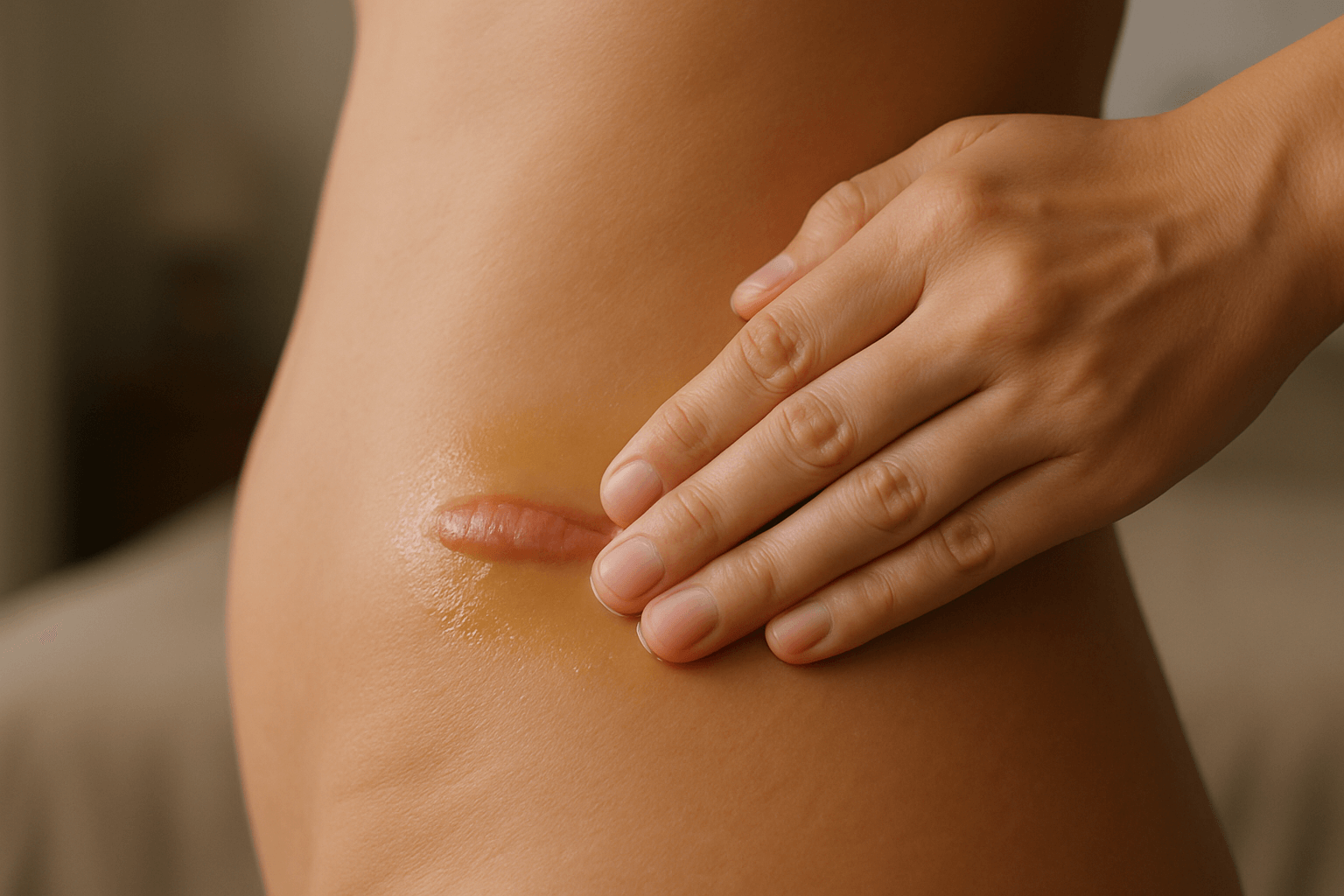
Keloids are super-scars. When skin healing goes into overdrive and turns an ordinary scar into a large, lumpy, bumpy area, often bigger than the original wound, you get a keloid. Doctors may prescribe strong corticosteroid creams or even inject corticosteroid drugs to treat these overgrowths. If the area is not too large, the doctor may try freezing it off. Dermatologists may use lasers against larger scars. Surgery is a last resort, but frequently the keloids return after surgery.
Will Castor Oil Help Keloids?
Q. My husband had two large keloids in the middle of his chest. They hurt when he tried to wear his seatbelt in the car. He went to a surgeon who removed them with follow-up radiation. After a few months, the keloids came back even larger. The doctor injected potent steroids, but the keloids continued to grow and became more sensitive and itchier than before.
When I did a search on Google, I read about castor oil for keloids. He applied it at bedtime, and it was a miracle. After a few months, the keloids were completely gone, leaving only two flat scars on his chest. The doctor was in total shock.
A. These scars result from abnormal wound healing and are usually raised tissue that may be firm or rubbery (StatPearls, July 19, 2022). They almost always come back after surgical removal (Journal of Plastic Surgery and Hand Surgery, July 18, 2022).
Castor Oil as a Skin Remedy:
Scientists have not studied the use of castor oil on these skin lesions, but we’re glad to hear your husband had success. Readers have been touting its use as a home remedy for skin problems for a long time. Here’s one testimonial.
Q. I have been using castor oil for years on bruises in my family. It truly works.
It also works wonders as an anti-scar ointment. I used it on a surgical scar AFTER the stitches were removed. When I went back for a post-surgical appointment, the doctor could not locate his work. I had to point out the incision to him.
A. You are not the first person to recommend castor oil topically. You may be the first, however, who has reported such success for healing such recalcitrant scars. Scientists have used a primary component of castor oil, ricinoleic acid, to speed wound healing in rats (Polymers for Advanced Technologies, June 2018).
Watch Out for Allergic Reactions:
Some people may be allergic to castor oil, so please exercise caution. Testing a drop or two on the inside of the forearm should be adequate. The reaction is a form of contact dermatitis (Contact Dermatitis, May 2007).
Citations:
- McGinty S & Siddiqui WJ, “Keloid.” StatPearls, July 19, 2022.
- Bjerremand JR et al, “Excision and adjuvant treatment to prevent keloid recurrence. – a systematic review of prospective, clinical, controlled trials.” Journal of Plastic Surgery and Hand Surgery, July 18, 2022. DOI: 10.1080/2000656X.2022.2097251
- Nada AA et al, “Bioactive polymeric formulations for wound healing.” Polymers for Advanced Technologies, June 2018. DOI: 10.1002/pat.4288
- Kalavala M et al, “Allergic contact dermatitis to polyethylene glycol-7 hydrogenated castor oil.” Contact Dermatitis, May 2007. DOI: 10.1111/j.1600-0536.2006.00986.x
Joint Pain and Knee Problems
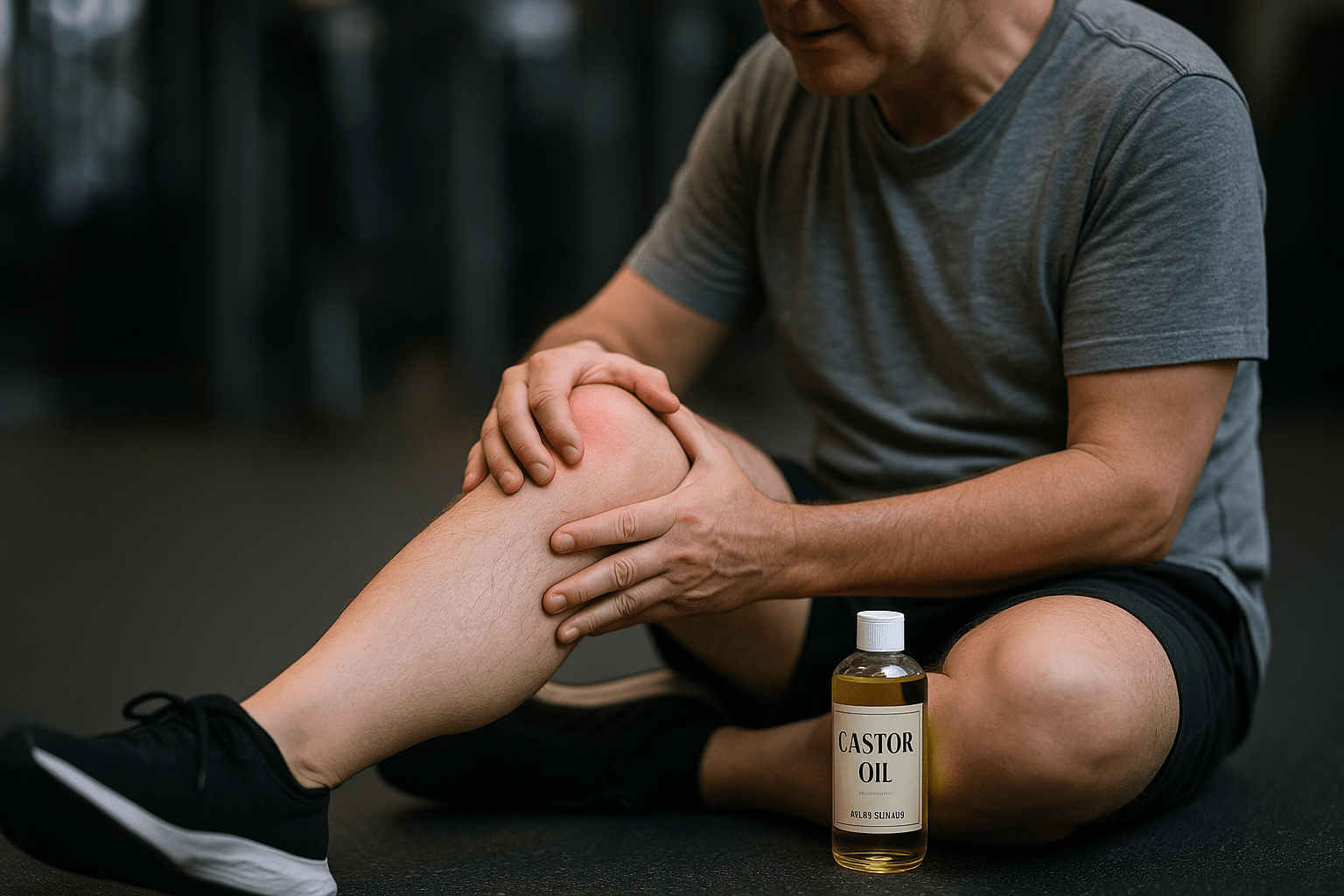
Castor oil is an old-time remedy. The oil comes from the seeds of the Ricinus communis plant, which has been used for thousands of years. The ancient Egyptians used castor oil in their lamps because it was slow burning. They also used it as a body oil for their skin. Medicinally, it was valued as a laxative. The famed Christian mystic, Edgar Cayce, loved castor oil, aka Palma Christi (the palm of Christ). He wrote about it in his books and used it for fungal infections, acne, inflammation and wound healing.
Treatment with CO “Packs”
Cayce often recommended castor oil packs to his “clients.” They were told to fold soft flannel cloth a couple of times, soak the flannel in the oil, wring it out, and then apply it to the area on the body that “needs treatment.” This topical remedy has been used for a wide variety of conditions, from bruises and warts to cracked fingertips and sore joints.
Castor Oil for Joint Pain:
Q. A friend told us about topical castor oil for pain relief. My husband thought he’d need a knee replacement soon, but once he started applying castor oil daily his joint is oiled up and ready to use.
I have told friends who used it on their foot or wrist. When my arthritis is acting up, I use it on my hip. It’s really helpful.
A. Readers of this column have been telling us for years that topical application of castor oil could be beneficial against arthritis pain. Animal research indicates that the active ingredient, ricinoleic acid, has anti-inflammatory activity (European Journal of Pharmacology, Oct. 27, 2000). Research suggests that repeated application offers the best results (Mediators of Inflammation, 2000).
Rescuing a Wrenched Knee:
Q. Castor oil is a life-saver for joints, especially knees.
A few years ago, my husband hurt/twisted his knee while getting in and out of a huge truck. The pain only increased as time went by, so we went to urgent care. After x-rays, etc., my husband was told that it really required surgery to repair and fix his knee, which was NOT in our budget at the time. What to do?
We had already heard about using castor oil on joints from a couple of doctors (M.D.) with knowledge in natural remedies, also.
How to Apply Castor Oil:
According to instructions, I massaged castor oil into his whole knee area; then I wrapped the whole area with an old cloth (that I would continue to keep stored/sealed in a zippy-bag, for re-use) and with saran-type-wrap, because the oil is both greasy and staining–it will not wash out. After that, we put a heating pad on the area (SET ON LOW heat) for an hour. We kept the wrappings on his knee over night.
I had to beg my husband to let me apply the oil and wrappings on the first night. The second night, he reminded me to fix up his knee again. Night number three, he did it himself, on his own. He woke up the next morning, with his knee feeling great.
If/when he or I ever hurt any joint, both of us know to rub with the castor oil, wrap with a cloth, cover for a while, and get relief. Heat does not have to be applied, but it helps.
There is nothing like castor oil for knees and joints. It’s messy, but who cares, if it helps prevent or STOP the need for surgery and if it stops pain?
A few years ago a non-oily version of castor oil came out on the market: Castiva. We always kept a tube or two around the house; we can not find it now, though. Any idea where we can find Castiva?
Castiva for Joint Pain:
A. Castiva Arthritis Pain Relief is still available. You can find it online or in independent pharmacies. Castiva contains a castor oil base and comes in both a warming formula (capsaicin) or a cooling formula (menthol and methyl salicylate). Capsaicin (the hot stuff in hot chili peppers) has long been used to ease joint pain. Combined with castor oil we think this is a winning formulation.
Diane in New York had a somewhat similar experience:
“My mother was always ahead of her time with everything. She was a vegetarian all her life of 88 yrs. She did yoga for 55 yrs (before it became popular) and read Edgar Cayce and became a fan of castor oil immediately.
“I have recently had unexplained extreme pain in my knee area and shoulder. Blood tests ruled out lupus and Lyme (I had a tick bite last year). The blood work showed inflammation. The Rheumatologist recommended medication but I chose the oil route instead. I experienced improvement within a few days.
“Prior to the castor oil pack I could not stand or walk without a knee brace and cane. Now nothing, no pain at all…RIP Mom.”
Other Uses for Pain:
D.G. uses it for a variety of aches and pains:
“I rub castor oil on my aches and pains, and it helps a lot. Some people make packs. I used them when the doctors said I had liver cancer. We don’t know what happened to the liver cancer! It is gone. I use castor oil every chance I get. I hope it works for others! Take care!!”
Citations:
- Vieira C et al, “Antinociceptive activity of ricinoleic acid, a capsaicin-like compound devoid of pungent properties.” European Journal of Pharmacology, Oct. 27, 2000. DOI: 10.1016/s0014-2999(00)00727-5
- Vieira C et al, “Effect of ricinoleic acid in acute and subchronic experimental models of inflammation.” Mediators of Inflammation, 2000. DOI: 10.1080/09629350020025737
Itching and Insect Bites
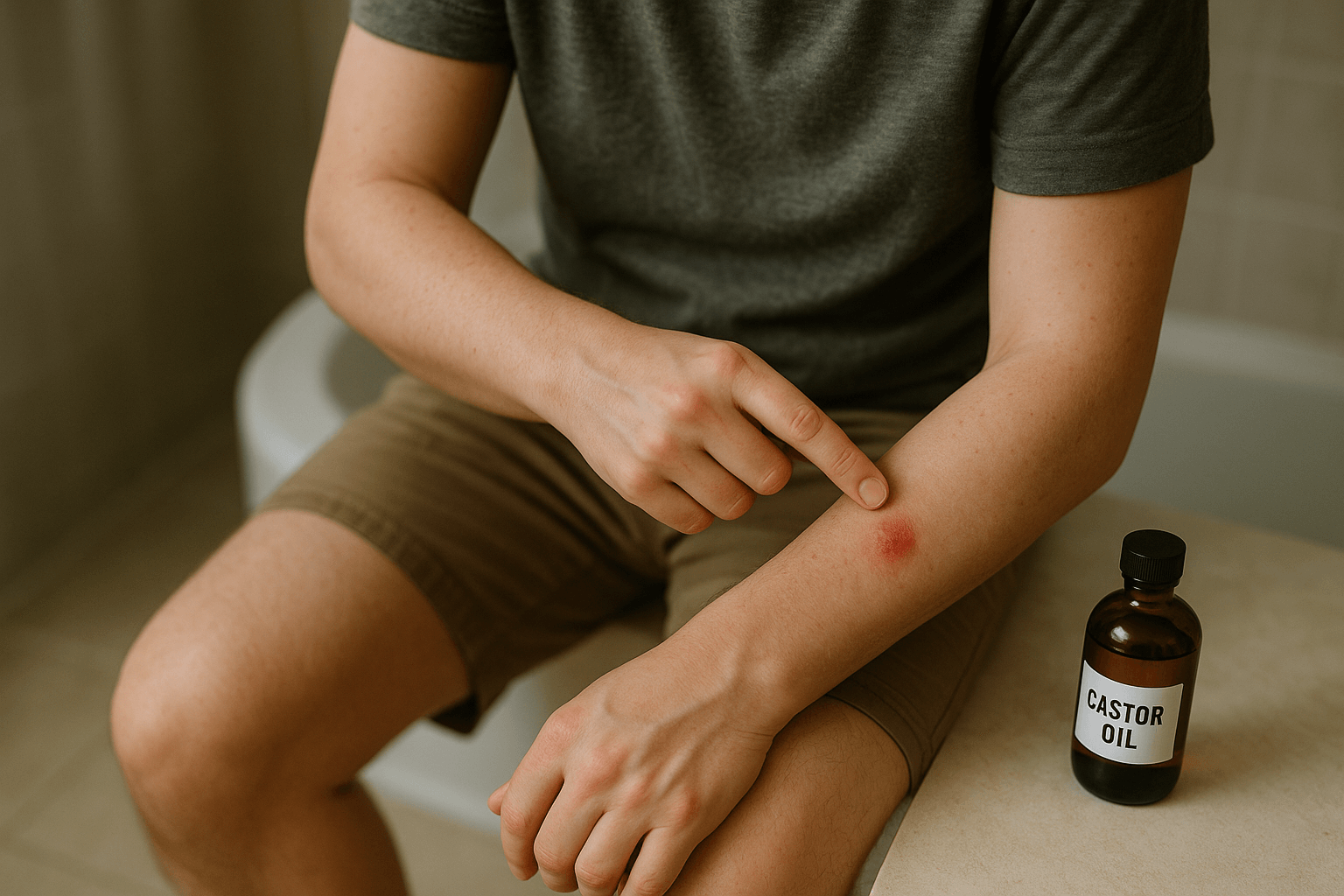
Castor Oil Eases Itching from Fire Ant Bites:
Q. Here is a home remedy for you. I got bitten by fire ants yesterday, and the bites swelled up and itched like crazy. I applied castor oil right away, and the itching stopped. The bites are just a little bit swollen today, and they don’t itch at all. Castor oil sure works on ant bites!
A. Castor oil is an old-fashioned remedy that was once used as a laxative. We’ve heard of using it on warts, bruises and sore joints, but this is the first we’ve heard of using it on ant bites. Other remedies that readers have successfully used on fire ant bites include baking soda and vinegar, toothpaste and Vicks VapoRub.
Traditional Uses and Safety Considerations

A Traditional Use for Ricinus communis:
Many people use castor oil as a super strong laxative. We advise against this however, since it can lead to cramping, abdominal pain and diarrhea.
S.B. says:
“My friend uses a spoon of castor oil with warm water at bedtime. Her constipation, which she was having for years, is gone. Castor oil is not very pleasant to take, but she found this worked best for her.”
P.J.D. has an unpleasant castor oil memory to share:
“YUCK! I remember my mom giving us Castor Oil! Just saying the name makes me “yuck”. I am now 69 and how funny that just saying castor oil still makes me want to upchuck. This has to be a psychological unpleasant memory.”
Do You Like Old-Timey Home Remedies?
Castor oil dates back to the ancient Egyptians. They rubbed it on their skin and swallowed it as a laxative. They also used it in their lamps. If you find such information of interest, chances are good that you will love our book, Quick & Handy Home Remedies from The People’s Pharmacy. It is filled with hundreds of home remedies and stories from readers. You will discover other uses for castor oil such as against warts.
Inducing Labor:
One of the most unusual applications of this old-fashioned remedy is to start labor when a baby is overdue. We knew a pharmacist, John McDonald, in Durham, NC. He had a wall of his drugstore dedicated to pictures of babies that had been born after their mothers drank his special concoction containing castor oil. To our surprise, there are several studies of this effect.
A study published in the journal Women and Birth (April, 2018) concluded:
“Nearly 91% of women in the study who consumed the castor oil cocktail to induce labor were able to give birth vaginally with little to no maternal or fetal complications.”
Israeli researchers carried out a randomized controlled trial (Women and Birth, Feb. 2018).
They found that:
“Multiparous women in the intervention group exhibited a significant beneficial effect on entering active labor within 24, 36 and 48h after castor

